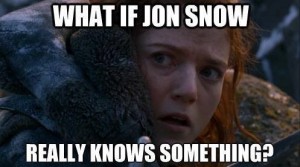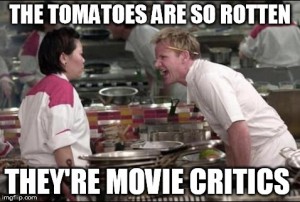 IN 1983, screenwriter William Goldman coined the famous saying that in Hollywood, “Nobody knows anything” when it comes to predicting which films will succeed at the box office.
IN 1983, screenwriter William Goldman coined the famous saying that in Hollywood, “Nobody knows anything” when it comes to predicting which films will succeed at the box office.
This holds true for books, too. However, the Economist recently published a 10-year study on movies that analysed the performance of over 2,000 films to see which factors help make a movie a hit.
The results show that there is much a movie studio can do to help a movie become a box office hit. Interestingly for us, most of that can also be applied to books, to help ensure their success.
The Budget
 The study found that the strongest predictor of absolute box-office receipts is a film’s budget.
The study found that the strongest predictor of absolute box-office receipts is a film’s budget.
Even if it got no boost from its cast, from favourable reviews or other factors, a movie would generate an average of 80 cents at American and Canadian cinemas for every dollar a studio promises to spend on it.
The more a studio commits to producing a film, the more it is likely to spend on advertising it. The budget also helps determine how widely a film is shown.
Sequels & Franchise: Child-Friendly Superheroes
 Sequels and franchise films are another way for studios to limit their risks. Nearly one in five of the films nowadays is a sequel, up from one in 12 a couple of decades ago. All other things being equal, sequels earn $35m more than non-sequels at the box office.
Sequels and franchise films are another way for studios to limit their risks. Nearly one in five of the films nowadays is a sequel, up from one in 12 a couple of decades ago. All other things being equal, sequels earn $35m more than non-sequels at the box office.
Franchise films increasingly depend on superhero characters. Hollywood made just eight superhero films between 1996 and 2000, but 19 in the past five years. A $200m-budget superhero film will earn $58m more at the box-office than a non-superhero film of the same budget.
Superhero films (“Deadpool” excepted) tend to be child-friendly, for good reason: films that receive an “R” (restricted) certificate typically earn $16m less in cinemas.
Everyone’s a Critic
 Do critics play a role in the success of films? Not as much as they would like to think. Between 1996 and 2006 an extra ten percentage points on the aggregate critics’ score on Rotten Tomatoes was associated with just $4m in extra box-office takings. Now it is worth just $1m.
Do critics play a role in the success of films? Not as much as they would like to think. Between 1996 and 2006 an extra ten percentage points on the aggregate critics’ score on Rotten Tomatoes was associated with just $4m in extra box-office takings. Now it is worth just $1m.
The wisdom of crowds matters more these days: the same increase in positive audience reviews on Rotten Tomatoes is associated with an $11.5m increase in box-office revenues.
Marketing
Taken together, these factors explain about 60% of the variation in box-office revenues. Adding an estimate of marketing costs increases the model’s accuracy by another 20 percentage points.
In Conclusion
The Economist’s analysis suggests a formula that maximises the chances of packing them in – in movies and, I believe, in books:
- Have a budget that will allow your book to be as professional as possible.
- Create a child-friendly superhero film with plenty of action and scope for turning it into a franchise.
- Set your budget high, but not recklessly so.
- Advertise and promote widely.
- Distribute it as widely as possible, and in the summer (when releases earn films an average of $15m more than at other times).
With reasonable reviews from the audience, your book should be a success. But do it for the money, not the plaudits: such a film would have just a one-in-500 chance of carrying off an Oscar for Best Picture.
Read the complete study on the Economist.





I don’t know about a child-friendly superhero. No murderous rage? Perish the thought! lol
Lol – it’s not for everyone 😀
I don’t know whether this is good news or not – I suppose its just the way it is. It makes sense that a marketing budget is key and should be as generous as we can manage. Creating momentum requires an investment. And sequels make a lot of sense when the story allows. Child action heroes…erm…
Lol – yes, I wouldn’t worry too much about that last one 😀
I agree with BeetleyPete actually. Most movies are crap designed to reach a certain audience, which is not discerning in any way. Its all about the money. But an interesting article. I think it does prove what we already know, that so long as you throw enough money at something, it will do well regardless. Lol!
Quite right 😀
Had to chuckle about how ‘Deadpool’ is the exception. It is a shame that most superhero comics are being placed into the PG-13 category. Some characters can’t be used like that, especially various villains.
It’s more fun when it’s the heroes, though 😉
True. I heard a rumor that Lobo would get a movie, but then the studio declared ‘No R-Rated Movies’. That’s a character you shouldn’t water down.
Sigh…
I smiled reading this. The very formula, that in my opinion, has ensured the death of real cinema, and the churning out of mindless pap, and pointless sequels.
Thanks for the confirmation, Nicholas.
Best wishes, Pete.
Lol – yes, there is that… 😀
And then turn your book into a move (or a few) 😉
movie, that is. lol
Yay movies 😀
Hmm, in the case of romance, the child-friendly hero has grown into an inked bad boy billionaire with rough hands and super hero stamina. Chart-topper 😀
50 shades, anyone? 😀